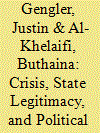| Srl | Item |
| 1 |
ID:
169371


|
|
|
|
|
| Summary/Abstract |
This article uses rare, nationally representative survey data collected before and after the blockade of Qatar that began in June 2017 to assess its impact on citizens' orientations toward the Gulf Cooperation Council, relations with key foreign countries, and domestic politics. The study illuminates a critical element missing from existing explanations of Qatar's unforeseen resilience in the face of the blockade, namely the role of ordinary Qataris, who mobilized in defense of the political status quo.
|
|
|
|
|
|
|
|
|
|
|
|
|
|
|
|
| 2 |
ID:
169372


|
|
|
|
|
| Summary/Abstract |
Based on research conducted between 2011 and 2014 on how Syrians experience, interpret, and redefine ethnic and religious-based differences, this article explores the dynamics that have made sectarianism such a salient feature of the Syrian conflict. Two distinct forms of sectarianism are simultaneously at work: a preexisting ethno-religious communitarianism and a more recent, dehumanizing sectarian outlook that emerged during the conflict. While the two are correlated, they are outcomes of different processes and conditions. As a byproduct of the Syrian conflict, sectarianism can thus neither be deemed the outcome of a process superseding the conflict nor the expression of preexisting conditions.
|
|
|
|
|
|
|
|
|
|
|
|
|
|
|
|
| 3 |
ID:
169373


|
|
|
|
|
| Summary/Abstract |
Saudi Arabia's historic communist movement is considerably overlooked in the literature on secular dissent in the kingdom. This article attempts to address this gap by offering a historical account of the movement's early formation, dispersion, radicalization and, ultimately, transformation into the Communist Party of Saudi Arabia. This metamorphosis from a diffuse and ideologically eclectic organization into a more orthodox, Soviet-style, and structurally coherent party, paradoxically, marked the Saudi movement's political twilight as it assumed an organizational and intellectual straitjacket that contributed to its demise.
|
|
|
|
|
|
|
|
|
|
|
|
|
|
|
|
| 4 |
ID:
169369


|
|
|
|
|
| Summary/Abstract |
This article argues that the widespread notion that Israel lacks a Palestinian negotiating partner has endured in Israeli society despite the security community's unease with this narrative. Many of Israel's former generals and spymasters, some of whom were interviewed for this article, have argued that the "no partner" mantra runs counter to Israeli interests and that there are steps the government of Benjamin Netanyahu has avoided taking that would keep prospects for a two-state solution alive.
|
|
|
|
|
|
|
|
|
|
|
|
|
|
|
|
| 5 |
ID:
169370


|
|
|
|
|
| Summary/Abstract |
This article addresses the crucial question of why European policies in the IsraeliPalestinian arena have remained contradictory and partly counterproductive. It suggests that European policies are stuck in the (no longer pertinent) logic of the Oslo process to achieve a two-state solution. The reasons for this stasis include the peculiarities of the European Union's decision-making process, lack of consensus within the international community on any alternative framework, and Europe's prioritization of stability in its "neighborhood."
|
|
|
|
|
|
|
|
|
|
|
|
|
|
|
|